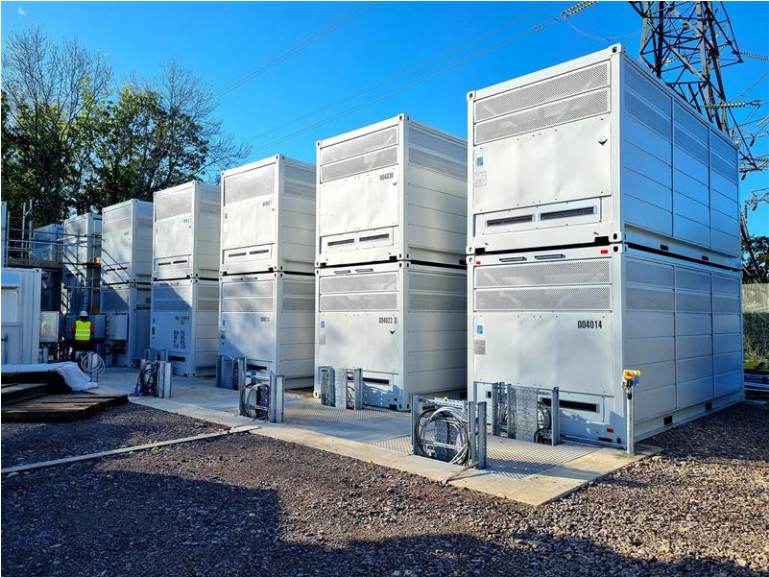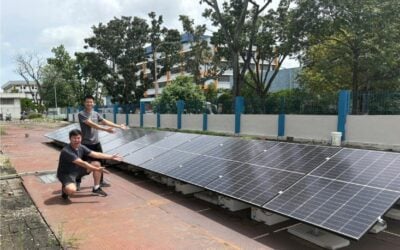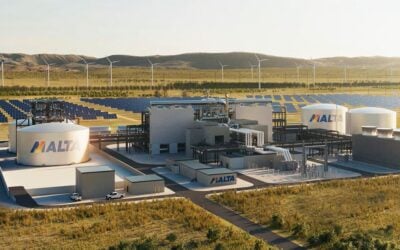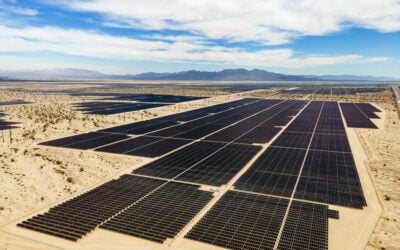
The first awards of funding designed to “turbocharge” UK projects developing long-duration energy storage technologies have been made by the country’s government, with £6.7 million (US$9.11 million) pledged.
The total £68 million competitive funding opportunity was launched by the Department for Business, Energy and Industrial Strategy (BEIS) in June 2021 through the national Net Zero Innovation Portfolio (NZIP).
Enjoy 12 months of exclusive analysis
- Regular insight and analysis of the industry’s biggest developments
- In-depth interviews with the industry’s leading figures
- Annual digital subscription to the PV Tech Power journal
- Discounts on Solar Media’s portfolio of events, in-person and virtual
Announced this morning — as BEIS innovation programme manager Georgina Morris prepares to join speakers at the Energy Storage Summit 2022 in London today and tomorrow, hosted by our publisher, Solar Media — a total of 24 projects have now received funding through the Longer Duration Energy Storage Demonstration Programme.
The awards are split into two streams: Stream 1 is for demonstration projects of technologies considered close to commercialisation and aiming to accelerate that process so that they can be deployed on the UK energy system. Stream 2 seeks to accelerate the commercialisation of innovative projects through building “first-of-a-kind” prototypes of full systems.
The five awarded Stream 1 projects are a membrane free green hydrogen electrolyser, gravity-based energy storage, vanadium redox flow battery (VRFB), advanced compressed air energy storage (A-CAES) and a bundled solution of pressurised seawater and compressed air.
Thermal storage technologies were eligible, but none have received funding.
Stream 1 projects will receive funding ranging from £471,760 to £1 million per project.
There are however six thermal energy storage technologies among the 19 Stream 2 awardees. Stream 2 winners must deliver feasibility study reports for their proposed technologies and contribute to knowledge sharing and “sector capacity-building,” BEIS said.
Stream 2 funding ranging from £79,560 to £150,000 went to the six thermal storage projects, four power-to-x category projects and nine electrical energy storage projects.
Awardees
Stream 1
| Technology type | Project name | Lead party | Location | Technology/scope | Funding (£) |
| Power-to-x energy storage | Ballylumford Power-to-X | B9 Energy Storage | Ballylumford, Northern Ireland | 20MW green hydrogen electrolyser storing curtailed wind in salt caverns | 986,082 |
| Electrical energy storage | GraviSTORE | Gravitricity | Northern England | Multiweight energy storage charged and discharged by lifting and lowering weights in an underground vertical shaft | 912,410.84 |
| Electrical energy storage | Long Duration Offshore Storage Bundle | Subsea 7 Limited | Aberdeen, Scotland | Combining pressurised seawater and compressed air using hydro-pneumatic tech | 471,760 |
| Electrical energy storage | Vanadium Flow Battery Longer Duration Energy Asset Demonstrator | Invinity Energy Systems | Bathgate, Scotland | Delivering power on demand from solar PV using 40MWh vanadium flow battery storage system | 708,371 |
| Electrical energy storage | Cheshire Energy Storage Centre | io consulting | Cheshire, UK | Using Hydrostor’s A-CAES tech to store energy as compressed air in defunct EDF gas cavities | 1,000,000 |
Stream 2
| Technology type | Project name | Lead party | Location | Technology/scope | Funding (£) |
| Thermal energy storage | EXTEND | Sunamp | East Lothian, Scotland | Feasibility study to extend duration of phase change material (PCM) based thermal storage for heating and hot water | 149,893 |
| Thermal energy storage | Exergy3 | University of Edinburgh | Edinburgh, Scotland | Prepare testing of 36MWh ultra-high temperature energy storage system for industrial process decarbonisation | 149,779 |
| Thermal energy storage | ADSorB | Active Building Centre Research Programme (Swansea University) | Swansea, Wales | Developing long-duration thermal storage and control systems for domestic heating and grid support | 143,440 |
| Thermal energy storage | PTES Demonstrator | SynchroStor | Edinburgh, Scotland | Feasibility study for repeatable grid-scale pumped thermal storage system | 79,560 |
| Thermal energy storage | Utilising Composite Phase Change Materials | Vital Energi | Blackburn, England | Support development of PCM-based thermal storage | 131,214 |
| Thermal energy storage | INHERENT | Energy Systems Catapult Services Limited | Birmingham, England | Demonstrate ability of domestic thermal storage to provide low-cost, long-duration storage | 149,831 |
| Power-to-X energy storage | HyDUS | EDF R&D UK | Oxfordshire, England | Tech transfer and modification of metal hydride storage used in fusion sector for hydrogen (protium) storage | 149,602 |
| Power-to-X energy storage | HEOS | Haskins & Davey | Chester, England | Feasibility study for power-to-x tech based on storing hydrogen in metal hydride | 141,000 |
| Power-to-X energy storage | RIPCURL | ITM Power | Sheffield, England | R&D into reducing reliance on Platinum Group Metal (PGM) in hydrogen electrolyser cells | 149,388 |
| Power-to-X energy storage | Hydrilite Refueller Prototype | Corre Energy | Wales | Long-duration hydrogen storage using patented storage medium Carbon280 Hydrilite | 149,922 |
| Electrical energy storage | FlexiTanker | Cheesecake Energy | Nottingham, England | Develop thermal and compressed air technology | 139,411 |
| Electrical energy storage | Sustainable Single Liquid Flow Battery | StorTera | Edinburgh, Scotland | Specify and cost MW-scale lithium sulfur flow battery demonstrator project | 148,940 |
| Electrical energy storage | High-Density Hydro Energy Storage | RheEnergise | London, England | Developing cost-optimised energy storage solution based on pumped hydro principles | 149,537 |
| Electrical energy storage | e-Zinc Energy Storage Systems | e-Zinc | UK (unspecified) | Accelerate commercialisation of zinc-based battery storage | 144,990 |
| Electrical energy storage | BlueStor | MSE International | Portsmouth, England | Feasibility study for marine and port-based energy storage using organic flow battery tech | 149,779 |
| Electrical energy storage | Marine Pumped Hydro | RCAM Technologies | Edinburgh, Scotland | Developing marine pumped hydro tech using 3D printed concrete | 150,000 |
| Electrical energy storage | Feasibility of Compressed Air Energy Storage in the Offshore UK Continental Shelf | Crondall Energy | UK (unspecified) | Develop application of compressed air storage on UK continental shelf | 149,086 |
| Electrical energy storage | Co-location of Flow Battery Storage with Solar PV | Locogen | Edinburgh, Scotland | Assess feasibility of colocating existing PV and flow batteries | 121,400 |
| Electrical energy storage | Renewable Copper | Energy Systems Catapult Services | Birmingham, England | Develop copper/zinc battery storage with 4-12 hour duration ahead of planned demonstrator in Scotland | 149,954 |
After launching the competition last year, BEIS opened up a three-month Call for Evidence on long-duration energy storage in July, assessing how best to enable long-duration technologies at scale.
A recent report from energy industry consultancy Aurora Energy Research found that up to 24GW of energy storage with a duration of four hours or greater could be needed to enable a net zero energy system in the UK by 2035.
This would enable the integration of variable renewable energy generation and also lower household energy bills by £1.13 billion a year in 2035. It could also reduce the country’s reliance on gas by 50TWh each year and lead to a 10MtCO2 reduction in emissions.
Aurora said however that high upfront costs, long lead times as well as a lack of revenue certainty and market signals are resulting in long-duration energy storage being underinvested into. Policy support and market reforms were recommended in the group’s report.
Another report by KPMG published a few weeks ago said that a cap and floor mechanism would be the best way to reduce investor risk while encouraging operators of long-duration facilities to respond to electricity system requirements.
In the US, the Department of Energy is hosting the Energy Storage Grand Challenge, a policy-driven effort to reduce costs and accelerate the adoption of energy storage, including a similar competitive funding opportunity for long-duration technologies and projects. Its aims include reducing the cost of long-duration energy storage 90% by 2030.
Meanwhile a cluster of European trade associations made a recent plea for the European Union (EU) to take a similarly proactive stance to support long-duration energy storage, particularly in the European Green Deal package.






